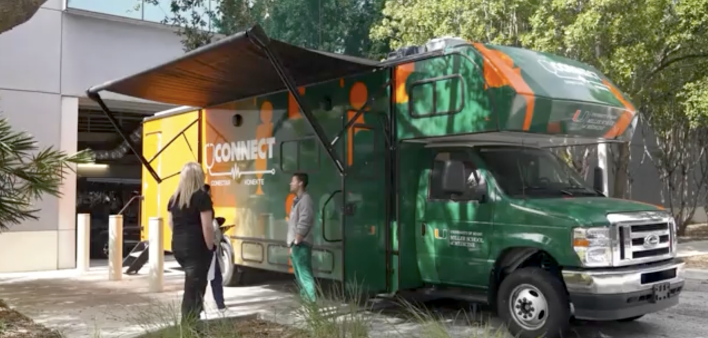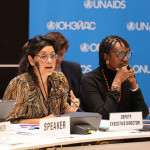A new mobile research van operated by doctors at the University of Miami Miller School of Medicine delivers information on HIV research to vulnerable South Florida communities to encourage HIV study participation, testing, treatment and prevention, the Miami Herald reports. The mobile unit was launched on World AIDS Day, December 1. The vehicle is the school’s fourth mobile unit offering HIV services.
Mobile clinic vans are transforming HIV care in Florida communities. For several years, UM doctors have provided HIV care via two mobile clinics: the IDEA Exchange mobile clinic for safe syringe exchange and the Rapid Access Wellness mobile unit, which provides pre-exposure prophylaxis (PrEP) for HIV prevention.
A third mobile unit, the Sylvester Comprehensive Cancer Center Game Changer, operated as a partnership, includes HIV and hepatitis screenings, according to the Miller School of Medicine.
The newest mobile research van, CONNECT, aims to expand outreach to South Florida neighborhoods with rising HIV diagnoses, such as North Miami and Broward County, to make it easier for people to learn about and participate in HIV studies, according to the Herald.
Florida is among the top five states in the country with the highest rates of HIV. More than 117,000 people in Florida were living with HIV in 2021, according to AIDSVu data. Miami-Dade and Broward counties house more than 50,000 people living with HIV.
“We want to go out in the community and let the community know of what research studies are ongoing in terms of both treatment and prevention as well as understanding how it’s affecting our community,” Maria Alcaide, MD, an infectious disease professor and director of clinical research at the Miller School of Medicine, told the Herald.
Through the mobile clinic, doctors inform community members living with HIV about various studies they can participate in. For example, the University of Miami MACS/WIHS Combined Cohort Study investigates the impact of chronic health conditions, such as heart and lung disorders, in people with HIV. Another study is seeking women ages 18 to 45 living with HIV or at risk for HIV and may be pregnant.
University of Miami doctors teach Floridians of all ages about the importance of HIV testing, prevention and treatment through community events such as yoga classes, dance contests and HIV Jeopardy.
In an article and related video by the Miller School of Medicine (which you can watch at the top of this article or here), Susanne Doblecki-Lewis, MD, MSPH, chief of the division of infectious diseases, said the mobile units help medical professionals “get out of the clinic, out of the hospital and into the communities with what we know works for HIV treatment and prevention.”







Comments
Comments